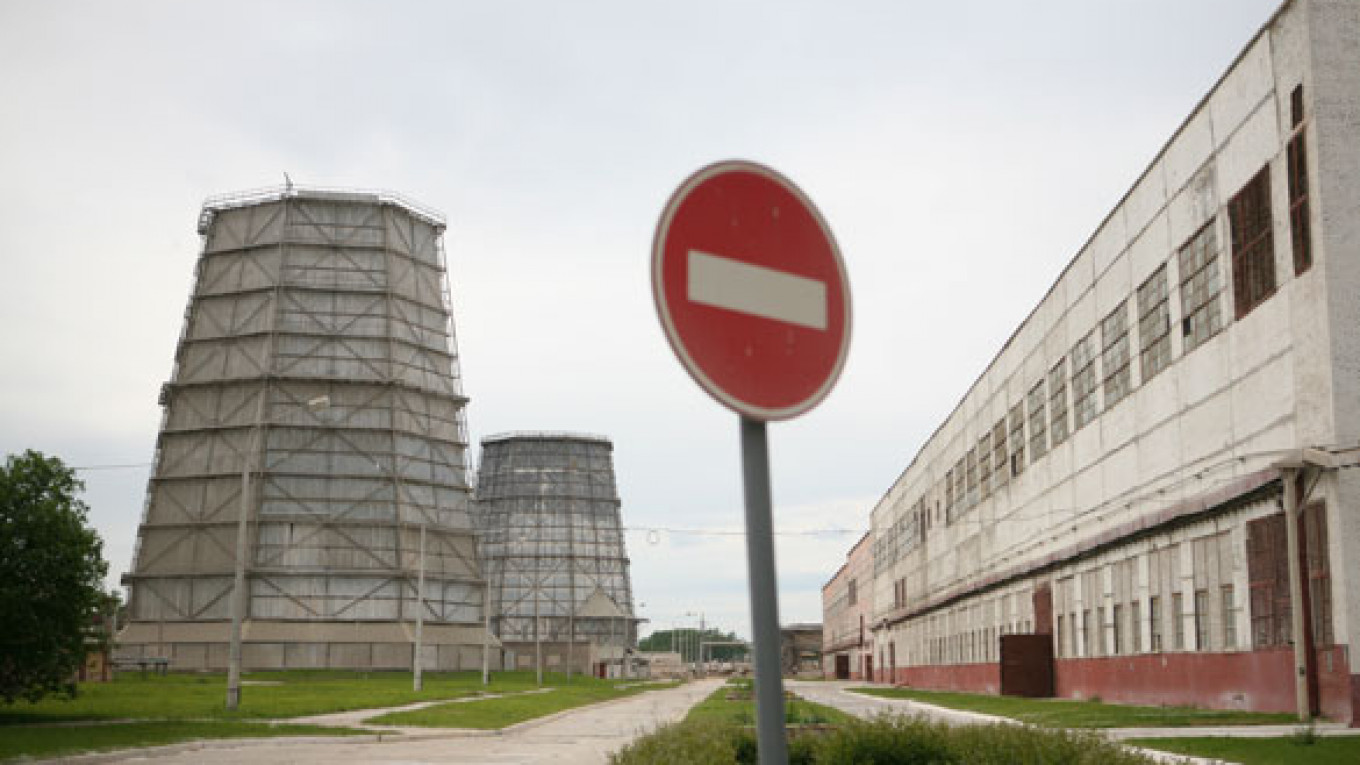Prime Minister Vladimir Putin said Tuesday that the signing of three agreements between companies working in the “infamous town of Pikalyovo” should serve as an example to officials and businesses of how to resolve conflicts and positively impact the development of single-industry towns.
Pikalyovo, a single-industry town in the Leningrad region, attracted nationwide attention last June when the prime minister publicly scolded Oleg Deripaska, owner and chief executive of Basic Element, for poor business practices at his Pikalyovo-based cement company, which resulted in unemployment and protests.
At the signing ceremony in the White House, Deripaska was in a much better mood than a few months ago, but kept out of the limelight. He stood at the corner of the room smiling, and even waved to the Health and Social Development Minister Tatyana Golikova.
“We are prepared to support the Pikalyovo factory, we are prepared to support other such companies on the territory of our country. But I would like to draw your attention to [the fact] that these kinds of problems need a systematic solution,” Putin said at the ceremony, prior to the Cabinet meeting.
“We will provide the support of the Russian government. The issue is that regional and local authorities, as well as company owners themselves, together with employees, should work under a unified plan,” he said.
The prime minister also said the federal government allocated 485 million rubles ($16 million) over the past two years in subsidies to deliver supplies to the plant, and would contribute an additional 300 million rubles next year.
Head of PhosAgro Maxim Volkov and general director of BaselCement-Pikalyovo signed an agreement to have BaselCement-Pikalyovo supply 1.15 million tons of nepheline concentrate to Apatit in 2011.
BaselCement-Pikalyovo also signed two agreements with Pikalyovskaya soda and Pikalyovo Cement to supply 1.2 million tons of carbonated solution and 1.1 million tons of nepheline slime accordingly.
The companies work as part of one ecosystem, where supply problems for one can cause disruption in the whole chain.
Deputy Regional Economic Development Minister Yury Osintsev pointed out that the key to solving the problem of single-industry towns is diversification. “Pikalyovo's problem from the point of view of mono dependence will be solved within the next two years,” Osintsev said after the Cabinet meeting.
In the case of Pikalyovo, the government supported five diverse projects, which should create about 1,000 jobs in 2011 and the beginning of 2012, he said.
So far 35 out of 300 single-industry towns have received government support from the Russian government, Osintsev said.
Osintsev also promised that Vneshekonombank will help single-industry towns draft feasibility studies for investment projects that will be part of their overall development plans, since these towns often lack personnel capable of compiling such studies.
Of the 1,500 projects in the 200 plans for developing single-industry towns so far submitted about half cost less than 100 million rubles, he said.
While the majority of the financial burden will fall on the federal government, it still expects regional authorities to supply “about 1 million rubles or a little bit more than that” per project.
At the Cabinet meeting, Putin also stressed the importance of timely and careful preparations for the 2018 WorldCup.
“The whole world will be looking at Russia,” he said.
The prime minister estimated that 3.5 million people will view the matches from the stadiums and 40 percent of them would be foreign tourists.
“We do not need any extra expenses,” Putin said.
While potential expenses for the football championship are already allocated in the state budget, he said he wants all numbers scrutinized for the next three years.
“It is clearly a lot of work,” Putin said.
A Message from The Moscow Times:
Dear readers,
We are facing unprecedented challenges. Russia's Prosecutor General's Office has designated The Moscow Times as an "undesirable" organization, criminalizing our work and putting our staff at risk of prosecution. This follows our earlier unjust labeling as a "foreign agent."
These actions are direct attempts to silence independent journalism in Russia. The authorities claim our work "discredits the decisions of the Russian leadership." We see things differently: we strive to provide accurate, unbiased reporting on Russia.
We, the journalists of The Moscow Times, refuse to be silenced. But to continue our work, we need your help.
Your support, no matter how small, makes a world of difference. If you can, please support us monthly starting from just $2. It's quick to set up, and every contribution makes a significant impact.
By supporting The Moscow Times, you're defending open, independent journalism in the face of repression. Thank you for standing with us.
Remind me later.






